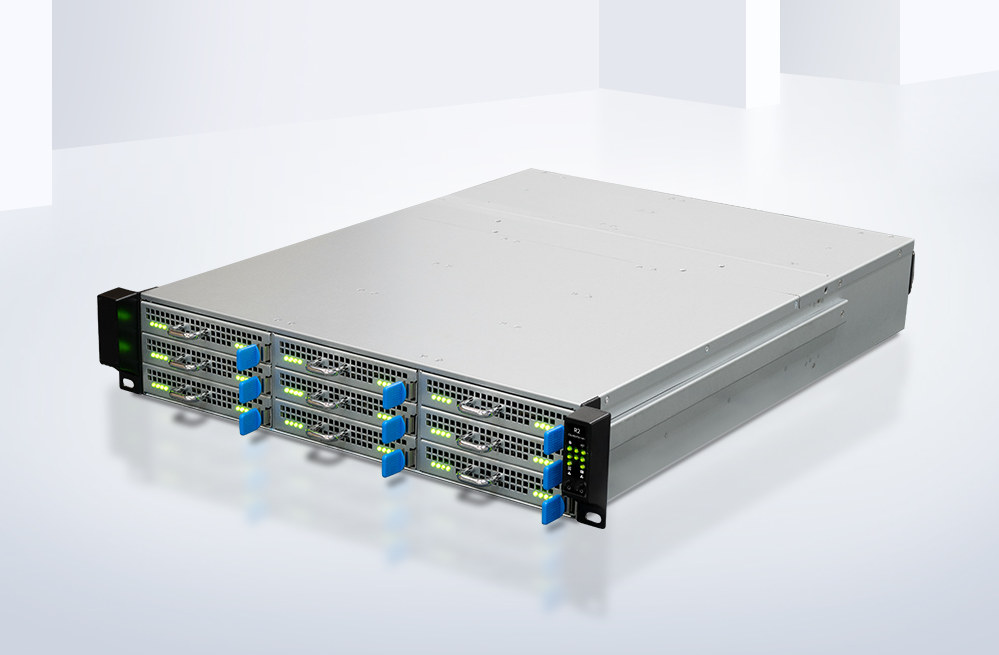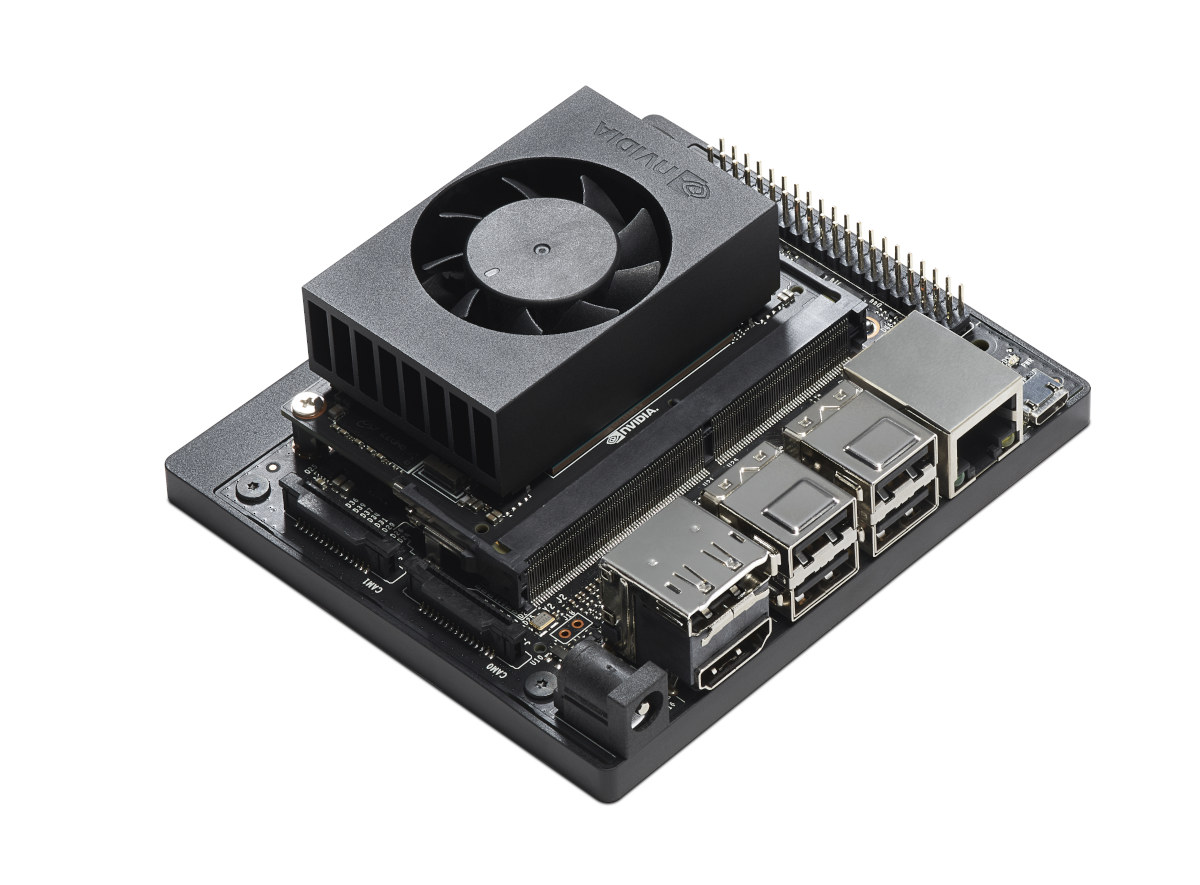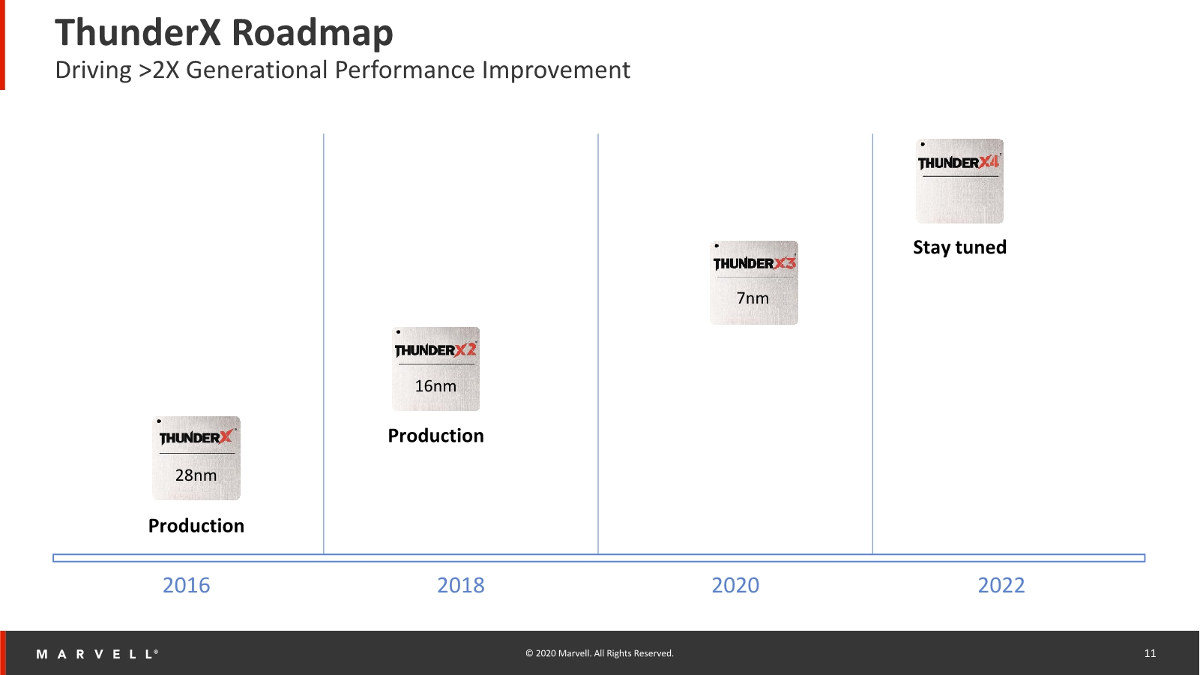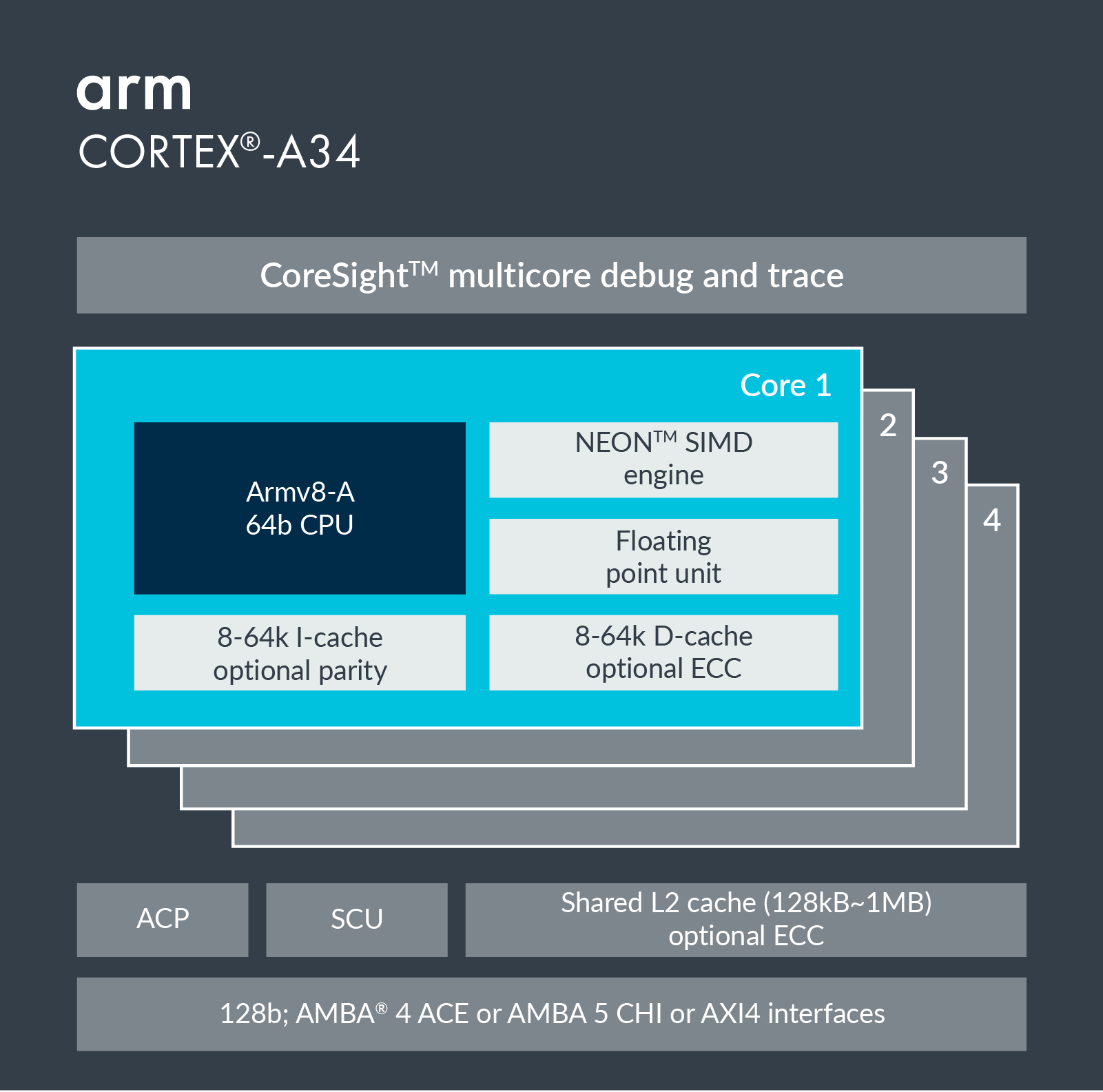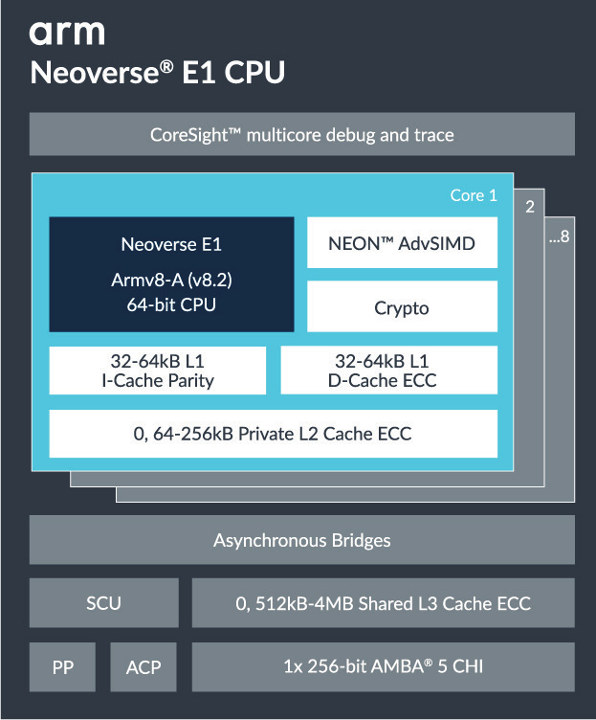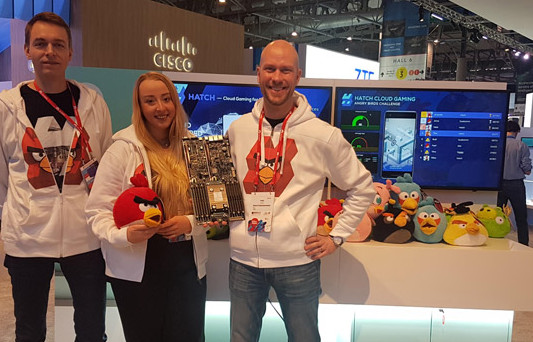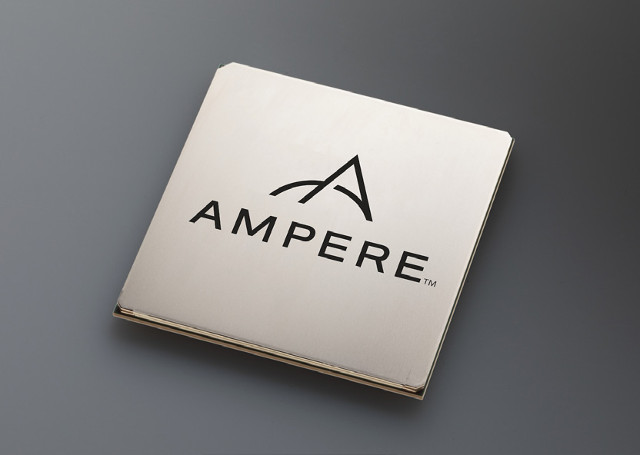Rockchip RK3399 and RK3328 are typically used in Chromebooks, single board computers, TV boxes, and all sort of AIoT devices, but if you ever wanted to create a cluster based on those processor, Firefly Cluster Server R2 leverages the company’s RK3399, RK3328, or even RK1808 NPU SoM to bring 72 modules to a 2U rack cluster server enclosure, for a total of up to 432 Arm Cortex-A72/A53 cores, 288 GB RAM, and two 3.5-inch hard drives. Firefly Cluster Server R2 specifications: Supported Modules Core-3399-JD4 with Rockchip RK3399 hexa-core Cortex-A72/A53 processor up to 1.5 GHz, up to 4GB RAM, and optional on-board 2.8 TOPS NPU (Gyrfalcon Lightspeeur SPR5801S) Core-3328-JD4 with Rockchip RK3328 quad-core Cortex-A53 processor up to 1.5 GHz, up to 4GB RAM Core-1808-JD4 with Rockchip RK1808 dual-core Cortex-A35 processor @ 1.6 GHz with integrated 3.0 TOPS NPU, up to 4GB RAM Configuration – Up to 9x blade nodes with 8x […]
NVIDIA Introduces Jetson Xavier NX Developer Kit, and Cloud-Native Support
NVIDIA Jetson Xavier NX SoM was launched last month for $459. But while some third-party carrier boards were also announced at the time, the company had yet to offer Jetson Xavier NX Developer Kit as they did for Jetson Nano. But as GTC 2020 conference is now taking place in the kitchen of Jensen Huang, NVIDIA CEO, the company had plenty to announce including Jetson Xavier NX Developer Kit as well as “Cloud-Native” support for all Jetson boards and modules. NVIDIA Jetson Xavier NX Developer Kit Specifications: CPU – 6-core NVIDIA Carmel ARMv8.2 64-bit processor with 6 MB L2 + 4 MB L3 cache GPU – NVIDIA Volta architecture with 384 NVIDIA CUDA cores and 48 Tensor cores Accelerators 2x NVDLA Engines 7-Way VLIW Vision Processor Memory – 8 GB 128-bit LPDDR4x 51.2GB/s Storage – MicroSD slot, M.2 Key M socket for NVMe SSD Video Output – HDMI and DisplayPort […]
Marvell ThunderX3 96-Core, 384-Thread Armv8.3 Server Processor Targets Cloud and HPC Workloads
Cavium first unveiled their 48-core 64-bit Arm ThunderX server processor in 2014, before following up with ThunderX2 featuring up to 56 cores @ 3.0 GHz providing 2 to 3 more performance compared to the first generation. Since then, the company has been acquired by Marvell, and now the latter has just announced ThunderX3 third-generation server processor with up to 96 cores, 384 threads in a single socket. Marvell explains that while x86 servers were historically designed to handle many applications for several thousand users, the market has changed and now servers are becoming more specialized, and for example, given the task to run one application used by millions of users. This change in the market provides opportunities for Arm server processors that do not have legacy features and can be highly customized and optimized. ThunderX3 key features: Up to 96 custom-designed Armv8.3+ cores @ up to 3.0 GHz 4 threads […]
Arm Cortex-A34 is a 64-bit Only Low-Power Core
Arm previously announced Cortex-A35 64-bit & 32-bit lower-power CPU core, and later on Cortex-A32 32-bit only Armv8 CPU core with the usual press release, and blog posts providing details about their new offering. But this morning, I saw a tweet about Cortex-A34… https://twitter.com/never_released/status/1157107187375886337 Based on the twitter handle, I first assumed it was “never released” ;), and was just an internal part name at Arm. But the new Cortex-A34 was actually very discreetly outed last month when Arm announced Flexible Access to lower the barrier of entry by allowing IC designers to access all Arm IP in the program, and only pay for IP blocks they actually use in the final product. Nevertheless, the product page and developer documentation are now up – albeit with limited info for the latter -, so we have more details. Some of the highlights of Arm Cortex-A34 core include: Architecture – 64-Bit Armv8-A Multicore […]
Arm Neoverse E1 & N1 Processors Target Edge and Cloud Infrastructure
Arm has just announced two new processors for compute workloads with a power efficient Neoverse E1 platform targeting edge devices like 5G base stations, as well as the more powerful Neoverse N1 platform designed for the cloud, and aiming at challenging Intel Xeon processors. Arm Neoverse E1 Key specifications and features of Arm Neoverse E1: Simultaneous Multithreading (SMT) supporting two threads concurrently Up to 8 cores (16 threads) per cluster Superscalar, out-of-order pipeline Configurable private L2 cache Configurable L3 cache Low-latency Accelerator Coherency Port (ACP) for closely coupled accelerator integration Support cache stashing into L2/L3 cache Arm Neoverse E1 is the first Arm processor to support SMT and is best suited for data plane compute workloads such as 4G/5G transport, software-defined networking, software-defined storage, and SD-WAN. The platform features a scalable architecture suitable for 10Gb wireless/wireline devices to high-performance 100G+ Dataplane Processing Unit (DPU). Arm developed a 5G small cell […]
Qualcomm Centriq 2400 Servers to Deliver Cloud based Mobile Gaming
Qualcomm Centriq 2400 Arm SoC launched at the end of last year, and with its 48 custom 64-bit Arm “Falkor” cores is optimized for datacenter workloads. But what everybody wants to know is whether it will run Crysis Angry Birds. And the answer is a resounding yes!, as Rovio’s subsidiary HATCH collaborated with Qualcomm to implement cloud gaming for mobile using Centriq 2400 based servers. The solution has the advantage of not requiring any additional downloads or installations after installing HATCH since everything is stored in the cloud, which also mean you’ll always get the latest version of the games. The game logic runs on the server, while the mobile phone takes user input in real-time, and the server can deliver 60 fps gaming for half the bandwidth required by HD video streaming. The company is now showcasing their solution at Mobile World Congress 2018 with an an early preview […]
Ampere SoC Designed for Cloud Computing Comes with 32 ARMv8 Cores @ 3.3 GHz, Supports up to 1TB RAM
Ampere is a brand new company that has just launched to “address memory performance, cost, space and power constraints for emerging hyperscale cloud applications and next-generation data centers”, and whose founders include Renee James (CEO), former president of Intel, among other “semiconductor and cloud computing experts”. Their upcoming 64-bit Arm server processors aim to achieve those goals via thirty two custom Armv8-A cores operating at up to 3.3 GHz, support for up to 1TB of RAM, and a 125 Watts power envelop, or around 4 Watts per core. Ampere SoC specifications listed by the company: Processor Subsystem 32x Armv8 64-bit CPU cores up to 3.3 GHz with Turbo 32 KB L1 I-cache, 32 KB L1 D-cache per core Shared 256 KB L2 cache per 2 cores System Memory 32 MB globally shared L3 cache 8x 72-bit DDR4-2667 channels Advanced ECC and DDR4 RAS features Up to 16 DIMMs, 1 TB/socket […]
Amazon AWS Greengrass Brings Local Compute, Messaging, Data Caching & Sync to ARM & x86 Devices
Amazon Web Services (AWS) provides cloud computing services to manage & store data from IoT Nodes over the Internet, but in some cases latency may be an issue, and Internet connectivity may not be reliable in all locations. AWS Greengrass provides a solution to those issues by running some of the IoT tasks within the local network in ARM or x86 edge gateways running Linux. You can still manage your devices from AWS cloud, but a Linux gateway running Greengrass Core runtime will be able to run AWS Lambda functions to perform tasks locally, keep device data in sync, and communicate with devices running AWS IoT Device SDK. Greengrass benefits include: Response to Local Events in Near Real-time Offline operation – Connected devices can operate with intermittent connectivity to the cloud, and synchronizes with AWS IoT once it is restored Secure Communication – AWS Greengrass authenticates and encrypts device data […]


